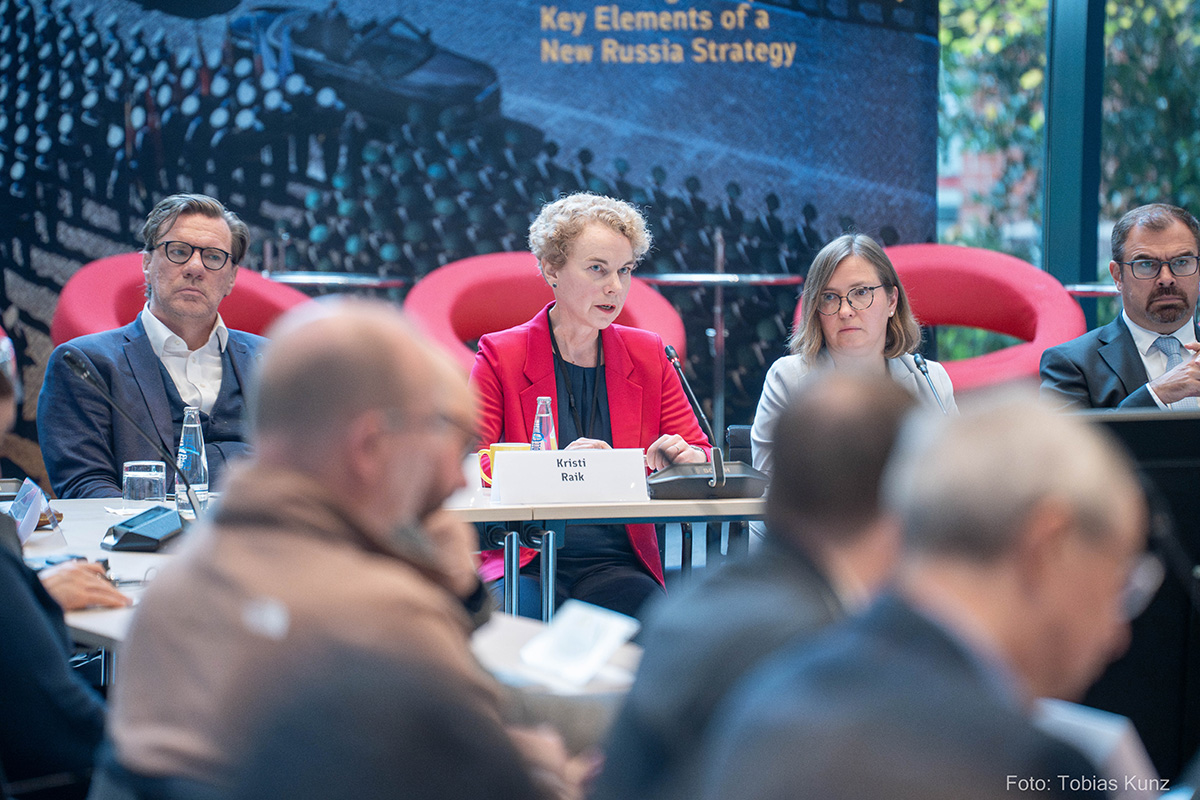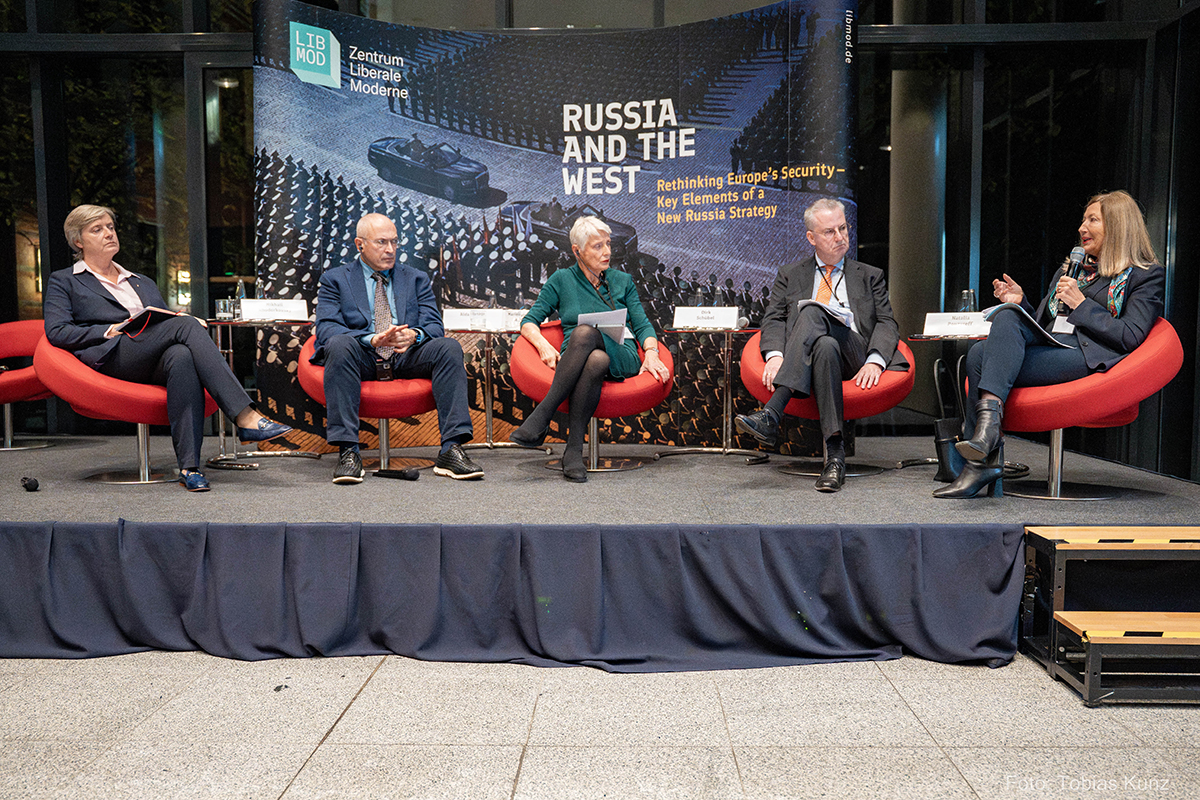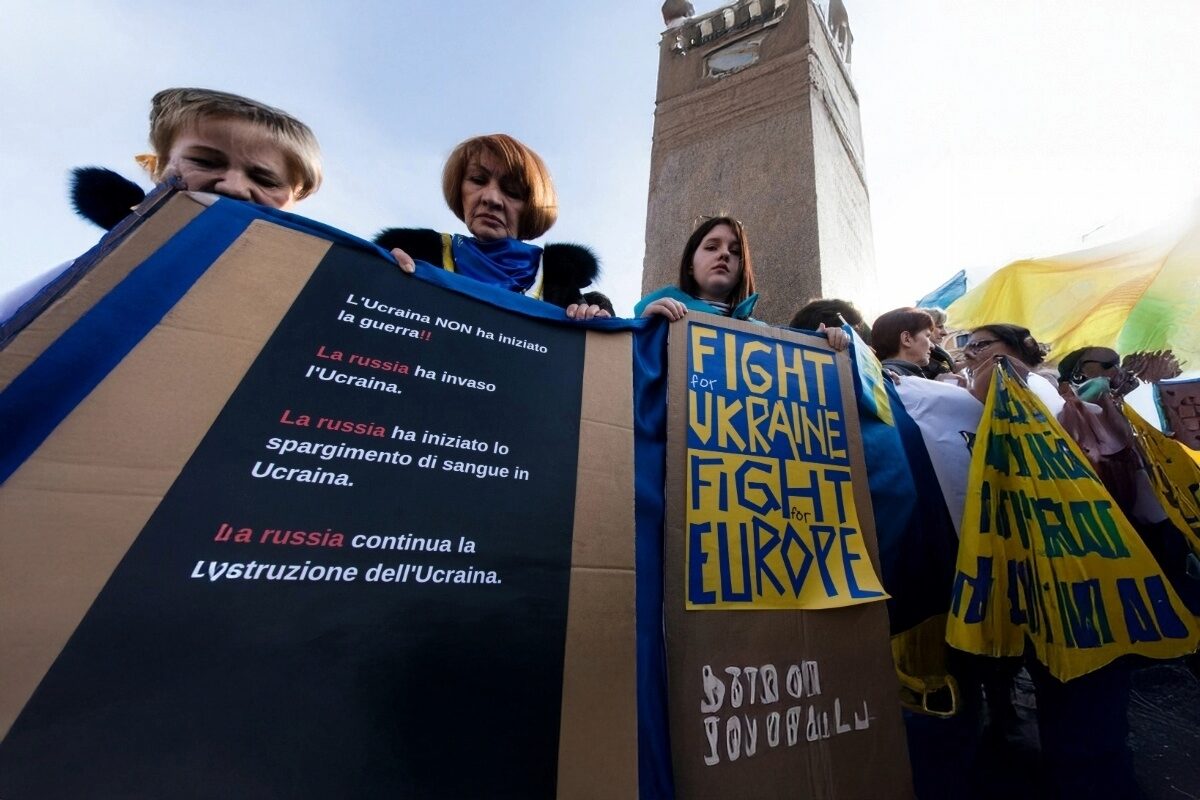Cracks under the surface: How resilient is Russia?

LibMod’s Maria Sannikova (left), OSW’s Maria Domanska and sociologist Alexandra Prokopenko.
With its overarching theme “How fragile is the Putin system?” the recent meeting of LibMod’s Expert Network Russia at the Eastern Studies Centre in Warsaw sent a clear message: A fragile Russia is a realistic scenario and Western policymakers need to prepare for this rather than fearing instability.
Editor’s note: We do not attribute quotes because the meeting was held under Chatham House Rules.
At first glance, the kickoff panel discussion “Cracks in the Ruling Elite: Oligarchs, Technocrats or the Siloviki?” brought a lot of evidence to the contrary: The experts agreed that the regime has consolidated considerably since last summer, when the revolt of the Wagner mercenaries failed and their ringleader Yevgeny Prigozhin was subsequently killed in a plane crash that bore hallmarks of a Kremlin-orchestrated assassination. “Even the Siloviki (the military and all other armed security services) showed resilience … and the armed forces adapted to the Ukrainian counteroffensive” one panelist said.
Since then, domestic repression in Russia has increased even more, especially against LGBT communities and the few remaining dissenters. There are growing fears that Vladimir Putin will use the presidential “election” in March not just to secure himself another six years in office but to further weaken any internal opponents.
Also, the personal sanctions against Russian businesspeople are not working as intended: While those targeted may be unhappy about the sanctions, they are o.k. with Putin. And a seemingly strong Putin makes splits less likely: “The elites only confront the President with uncomfortable truths when they feel he is losing. When they feel he is winning, nobody dares”, one panelist argued.
Nevertheless, there clearly is fragility below the surface. Russian business is unhappy with the Kremlin’s imposition of capital controls and the growing number of asset redistributions. Panelists also noted that the Kremlin fears a radicalization of mass sentiment for social reasons as well as dissatisfaction with the lack of resources and decision-making competencies in the regions.
The Prigozhin revolt caught the regime off guard to some extent, because it was carried out by nationalist hardliners. However, Russia’s nationalist opposition was soon exposed as being overrated. When Igor Girkin, their most outspoken figure, was arrested on 21 July, protests were at best muted.
Many panelists identified the so-called technocrats as the strongest elite group to emerge from the war. Unassuming but effective bureaucrats like Prime Minister Mikhail Mishustin and Central Bank Governor Elvira Nabiullina are credited with keeping Russia functioning despite sanctions. Mishustin is emerging as a potential successor to Putin: “The technocrats’ adaption is so strong that they can remain in place even without Putin”, one participant said.
Russia’s economic resilience – an illusion?
The Russian economy presents a similar picture. While on the surface, GDP has been growing since the sanctions regime’s imposition, a closer look tells another story: The “new Russian economy” that emerged this year, actually is less resilient than the previous one: There is a massive labour shortage and the arms sector could expand only at the expense of civilian industrial production, which has stagnated since May 2023.
Also, labour productivity is 6 to 11 times lower than in Western Europe. Exports are less diversified (non-energy exports are down by 50 per cent) and the country is more dependent on imports while at the same time diversifying its import sources. The transition towards a war economy means that GDP growth no longer reflects increases in the quality of life. Any further brain drain, like the 2022 exodus that followed the Kremlin’s mobilization, will directly affect Moscow’s arms production. Russia will emerge from the war as a poorer country with a more backward economy (at least outside the arms sector).
Takeaways from Ralf @fuecks on what the W should do
1 Discourage Russian elites to expect that they can win the war
2 Delegitimate Putin’s power
3 Hold Russia legally accountable
4 Strengthen/recalibrate sanctions
5 Support Russian civil society/opposition as much as we can pic.twitter.com/GBJZbrcE2M— Russland verstehen (@RusVerstehen) November 20, 2023
Russia also has relatively few currency reserves of just under 600 billion dollars. “If the oil price falls below 40 dollars it will be difficult to defend the rouble” one expert concluded. But if oil remains expensive, Moscow can keep funding its military. It is therefore vital that the sanctions – especially on oil and gas exports and high tech-imports – are implemented more effectively. Among the panel’s proposals were improved monitoring and mechanisms to restrict Russia’s oil and gas sales.
But while sanctions hurt, they won’t kill the economy, nor will they stop the onslaught against Ukraine. “The only way to stop the war is defeat on the battlefield” and “sanctions won’t bring down the regime, just look at Iran”, where two notable comments. However, maintaining economic sanctions could put pressure on any future Russian leader who succeeds Putin one day.
Why the West should not be afraid of regime change in Russia
If no constructive arrangement is possible with the current regime, should the West promote political change in Moscow? Experts on the third panel, who discussed this question, were adamant that while only Russians can make regime change happen, the West could create the conditions for this. A crucial factor would be to make Russia lose the war and to create a situation in which the elites lose hope that Putin will be successful in the long term.
A central theme was that Russia does not have an invariable authoritarian DNA and that past western policies often perpetuated the country’s path dependency by doing far too little to foster democracy. Another argument is that a democratic Russia is in our interest because an autocratic Russia will always be aggressive towards its neighbors.
The challenge, of course, is how to influence Russian society. Some argued that, paradoxically, despite the internet it is harder to reach Russian domestic audiences today than during the Cold War years, when Radio Liberty made inroads against the Communist Party press.
Another challenge lies in Western capitals, where there is not only widespread fear of escalation of the war and post-Putin instability, but where certain leaders would happily have a transactional relationship with Putin.
But resignation is not the way forward. “Even if it is hard and not a rewarding job, we have no other way: The alternative is to allow this regime to succeed”, one panelist concluded.

Did you like this article? If yes, you can support the independent editorial work and journalism of LibMod via a simple donation tool.
Donate via PayPal
![]()
We are recognized as a non-profit organization, accordingly donations are tax deductible. For a donation receipt (necessary for an amount over 200 EUR), please send your address data to finanzen@libmod.de
Related topics
order Newsletter
Stay tuned with our regular newsletter about all our relevant subjects.






